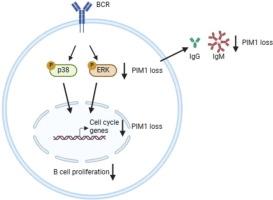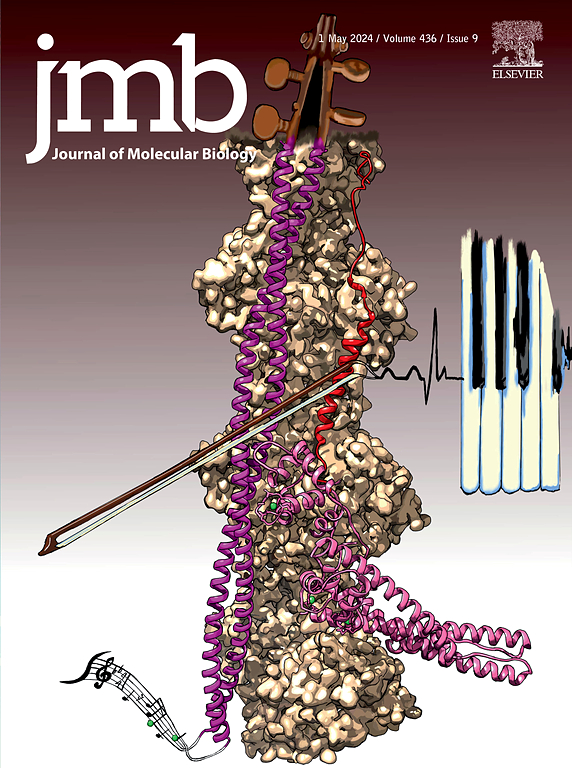Pim1 在 B 细胞的独立于 T 细胞的 B 细胞反应和 MAPK 激活中至关重要。
IF 4.5
2区 生物学
Q1 BIOCHEMISTRY & MOLECULAR BIOLOGY
引用次数: 0
摘要
Pim 家族由三个成员组成,它们编码一类不同的高度保守的丝氨酸/苏氨酸激酶。在这项研究中,我们产生并研究了造血特异性缺失 Pim1 的小鼠和骨髓(BM)嵌合体小鼠。Pim1 在 B 细胞发育的各个阶段都有表达,造血特异性缺失 Pim1 会改变 BM、脾脏和腹膜中 B 细胞的发育。然而,Pim1 的缺失并不影响 T 细胞的发育。对BM嵌合小鼠的研究表明,Pim1需要以细胞内在方式维持正常的B细胞发育。Pim1 缺乏会导致 B 细胞抗体反应发生显著变化。此外,Pim1 缺乏还会导致 B 细胞受体(BCR)诱导的细胞增殖和细胞周期进展减少。对 Pim1 缺乏的 B 细胞中 BCR 激活的各种信号通路进行的研究发现,丝裂原活化蛋白激酶(MAPKs)的激活存在缺陷,而众所周知,MAPKs 可调节参与细胞增殖和存活的基因;对 Pim1 缺乏的 B 细胞中 BCR 激活的 B 细胞进行的 qRT-PCR 分析显示,细胞周期蛋白依赖性激酶(CDK)和细胞周期蛋白基因(包括 CDK2、CCNB1 和 CCNE1)的表达减少。总之,Pim1 在 B 细胞发育和 B 细胞活化中起着至关重要的作用。本文章由计算机程序翻译,如有差异,请以英文原文为准。

Pim1 is Critical in T-cell-independent B-cell Response and MAPK Activation in B Cells
The Pim family consists of three members that encode a distinct class of highly conserved serine/threonine kinases. In this study, we generated and examined mice with hematopoiesis-specific deletion of Pim1 and bone marrow (BM) chimeric mice with B-cell-specific targeted deletion of Pim1. Pim1 was expressed at all stages of B-cell development and hematopoietic-specific deletion of Pim1 altered B-cell development in BM, spleen and peritoneal. However, Pim1 deficiency did not affect T-cell development. Studies of BM chimeric mice showed that Pim1 is required in a cell-intrinsic manner to maintain normal B-cell development. Pim1 deficiency led to significant changes in B cell antibody responses. Additionally, Pim1 deficiency resulted in reduced B cell receptor (BCR)-induced cell proliferation and cell cycle progression. Examination of the various BCR-activated signaling pathways in Pim1-deficient B cells reveals defective activation of mitogen-activated protein kinases (MAPKs), which are known to regulate genes involved in cell proliferation and survival. qRT-PCR analysis of BCR-engaged B cells from Pim1-deficient B cells revealed reduced expression of cyclin-dependent kinase (CDK) and cyclin genes, including CDK2, CCNB1 and CCNE1. In conclusion, Pim1 plays a crucial role in B-cell development and B cell activation.
求助全文
通过发布文献求助,成功后即可免费获取论文全文。
去求助
来源期刊

Journal of Molecular Biology
生物-生化与分子生物学
CiteScore
11.30
自引率
1.80%
发文量
412
审稿时长
28 days
期刊介绍:
Journal of Molecular Biology (JMB) provides high quality, comprehensive and broad coverage in all areas of molecular biology. The journal publishes original scientific research papers that provide mechanistic and functional insights and report a significant advance to the field. The journal encourages the submission of multidisciplinary studies that use complementary experimental and computational approaches to address challenging biological questions.
Research areas include but are not limited to: Biomolecular interactions, signaling networks, systems biology; Cell cycle, cell growth, cell differentiation; Cell death, autophagy; Cell signaling and regulation; Chemical biology; Computational biology, in combination with experimental studies; DNA replication, repair, and recombination; Development, regenerative biology, mechanistic and functional studies of stem cells; Epigenetics, chromatin structure and function; Gene expression; Membrane processes, cell surface proteins and cell-cell interactions; Methodological advances, both experimental and theoretical, including databases; Microbiology, virology, and interactions with the host or environment; Microbiota mechanistic and functional studies; Nuclear organization; Post-translational modifications, proteomics; Processing and function of biologically important macromolecules and complexes; Molecular basis of disease; RNA processing, structure and functions of non-coding RNAs, transcription; Sorting, spatiotemporal organization, trafficking; Structural biology; Synthetic biology; Translation, protein folding, chaperones, protein degradation and quality control.
 求助内容:
求助内容: 应助结果提醒方式:
应助结果提醒方式:


